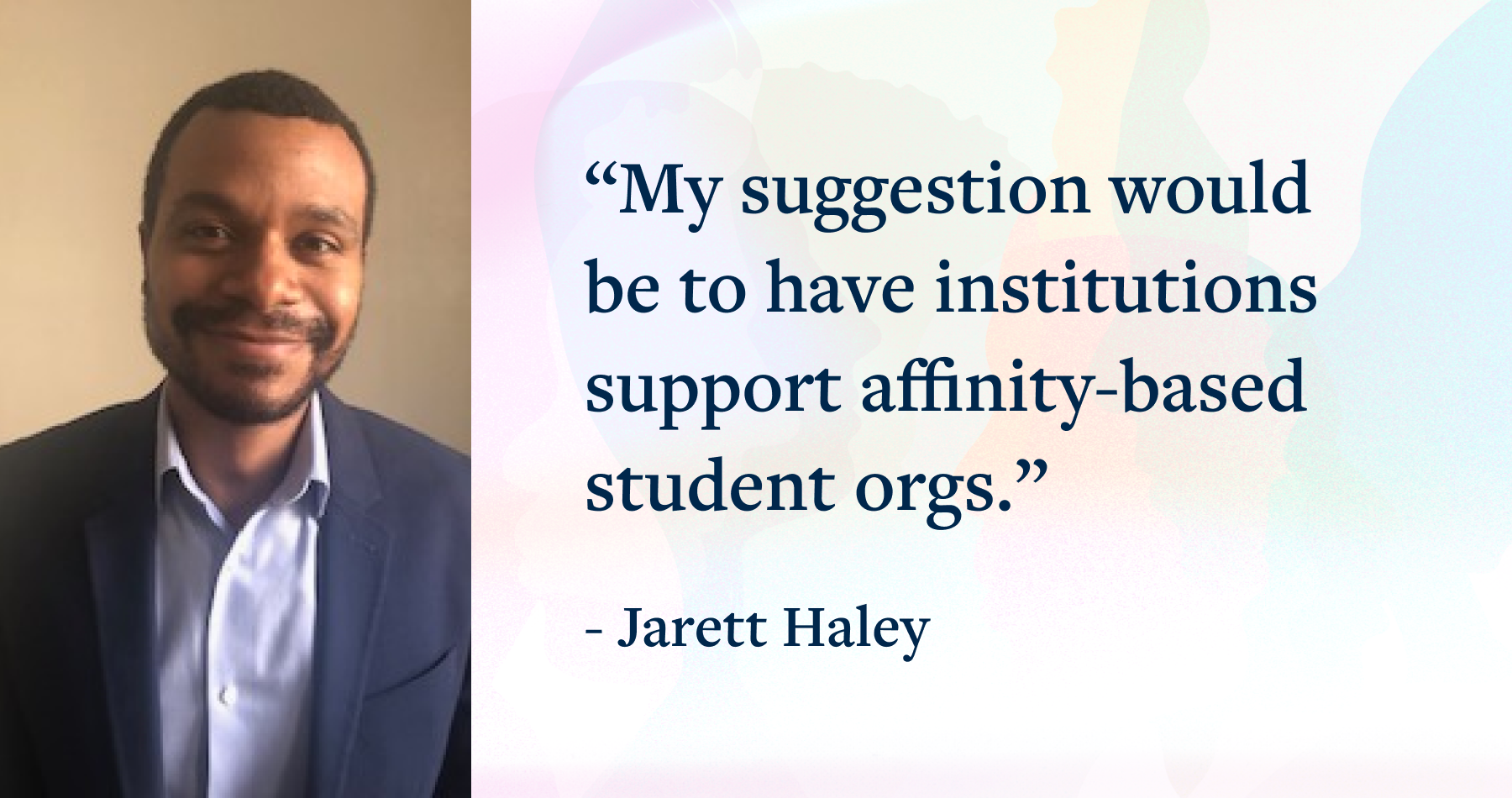Currently in the United States, ten states–Alabama, Florida, Idaho, Indiana, North Carolina , North Dakota, Tennessee, Texas, Utah, and Wyoming–have passed laws that significantly restrict diversity, equity, and inclusion (DEI) in higher education, a fact that is very much on the minds of Rackham Ph.D. candidate Jarett Haley and Rackham student Amber Williams, both at the Marsal Family School of Education’s Center for the Study of Higher and Postsecondary Education.
“It is particularly critical now for institutions to show their commitment to DEI by enhancing grad student experiences with DEI education and engagement experiences,” Haley says.
Haley and Williams are co-authors of Learning and (Dis)Connection: Graduate Students’ Experiences Seeking Diversity, Equity, and Inclusion Education and Engagement Opportunities, a 2023 paper published in Studies in Graduate and Postdoctoral Education, written with their advisor Rosemary Perez, Ph.D. and Claire R. Robbins, Ph.D. from Virginia Tech.
“No matter what sector, field, or discipline that you work within, having DEI competencies is really important when it comes to leadership, group work, change-making, and developing practices and policies. We can see the pitfalls when DEI competencies are absent,” Williams says.
Utilizing 44 graduate student interviews across various disciplines and fields at two public research institutions in the U.S., the paper is one of a few that explores graduate students’ participation in DEI education outside of their academic departments.

“Grad students often report being discouraged by faculty from engaging in DEI education and engagement experiences outside of departments,” Haley says.
While many departments offer professional development opportunities “in house,” such as conference attendance, visiting scholars, and panel discussions, Haley is eager to share what interviewees cited as the many benefits of DEI professional development opportunities outside of the department, including cultural competency building; learning language to describe the experiences many minoritized people face; awareness-building around privilege; meeting individuals outside of their discipline; exposure to new career paths; invitations to serve on hiring committees; feelings of closeness to the institution; and personal fulfillment.
“I wish more faculty members knew about the benefits of DEI experiences outside of their departments–and that they would encourage grad students to participate in these experiences and maybe even find ways to incorporate DEI education into their programs to some degree,” Haley says.
According to previous research by Perez, cited in the report, academic departments often focus less on improving culture and climate as it relates to DEI and more on increasing the number of underrepresented students within departments. Williams and Haley point out that the labor involved in both efforts is often undertaken by minoritized graduate students.
“Compositional diversity is really important, but currently there is a bit of taxation that minoritized graduate students endure in terms of supporting a lot of the DEI work in recruitment, outreach, engagement, and admissions,” Williams says.
In addition to the sheer number of hours spent on recruitment panels and community-building initiatives within their departments, Williams says, minoritized graduate students also have to navigate the complex realities of departments that may not have considered how their institutional approach to DEI informs faculty dynamics, advising, and/or other embedded structures.
“I don’t believe that the institution should step in and ‘do it all’ in terms of DEI efforts, but how can there be better transparency, perhaps better collaboration and institutionalization that better supports students in the ways that they want to engage in some of this work?” Williams says.
Williams points to funding opportunities that support graduate students interested in leading DEI efforts as a productive path for departments to consider. Haley concurs, mentioning an additional area in need of institutional support: student affinity groups.
In one interview for the report, a multiracial student member of an Asian American Pacific Islander student association felt particularly annoyed when an invited speaker to the group asked him about his ethnic identity. While the student reported encountering questions like this in other areas of his life, the posing of the question in a space that was meant to foster inclusion was particularly off-putting and left him feeling very disconnected from the group.
“My suggestion would be to have institutions support affinity-based student orgs. Don’t assume that the students are experts in leading these spaces,” Haley says.

Williams agrees, her consensus informed by past career experiences working as a program manager at the Office of Multi-Ethnic Student Affairs at U-M, where she was a staff advisor for affinity-based student groups. In addition to providing institutional knowledge about resources and protocols, Williams says that staff advisors to student affinity groups should be able to bring strong DEI competencies to the table.
“Minoritized student groups can have embedded inequities,” Williams says. “A staff member with strong DEI competencies can help normalize conflict, challenge power dynamics, and facilitate difficult conversations in a transformative way.”
How Rackham Helps
Both Haley and Williams are Rackham Merit Fellows and cite the program’s structured funding, professional development workshops, and community-building moments as being highly beneficial during their graduate studies.
“It has been really awesome to be a part of the Rackham Merit Fellowship community, especially the opportunity to get to know folks outside of my own discipline,” Williams says.
Haley, who is also a proud alumnus of the Rackham DEI Professional Development Certificate Program, cites Rackham workshops as being particularly helpful, especially during the early years of his doctoral program.

